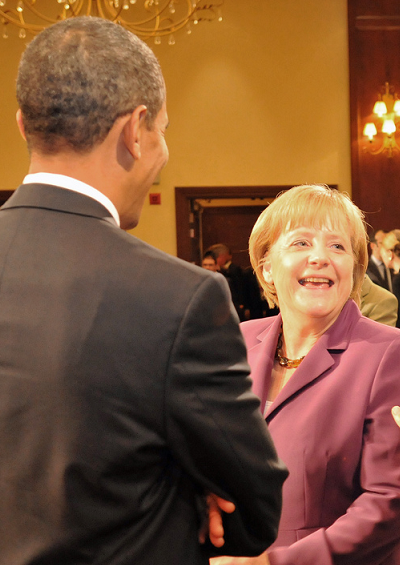Germany’s International Responsibility to Lead
Germany is still adjusting to its new role as a world leader.
February 5, 2015

Twenty-five years after the fall of the Berlin Wall, the world order we have come to know is unraveling. The severe economic crisis that has engulfed the world for the past six years may be fading, but is not over yet.
Over the course of this crisis, the economic foundation for German leadership has become clearer than ever. Germany has shouldered the brunt of the rescue of crisis countries in the European south, but also insisted on the strict implementation of reform measures.
With the French economy weakened, Germany’s leading position in the EU is now well established, although it has created a backlash in Greece as well as in France and other European countries.
All of this underscores the need for a significant role for Germany internationally. It is okay for Germany to lead — not alone, but in concert with its EU and North American partners.
Any other form of leadership – such as a Sonderweg (Special German Path) — is plainly unimaginable. This is so not because of Germany’s past, but because of the strong multilateral tradition of post-World War II German foreign policy.
Germany’s core answer to managing international issues is the defense of international norms and acceptance of more international responsibility.
Despite some inevitable naysayers, Germans are finding international acceptance for their role in managing the Eurozone crisis, building consensus in dealing with the Russian-Ukrainian War and the Transatlantic Trade and Investment Partnership (TTIP).
German leadership: Linked with United States
Germany’s international responsibility is inextricably linked to the German-American relationship. This relationship, however, is undergoing a significant change as the younger generation assumes leadership.
Not only is a common experience missing for younger Germans and eastern Germans particularly, but America’s relationship with Germany also faces a crisis of trust.
Rather than remembering Americans liberating Germany from Nazi rule and safeguarding its freedom against Soviet ambitions, policy issues that dominated the debate since 2000 have divided Germany and the United States.
Germany rejected the 2003 Iraq War, Guantanamo Prison and torture. Trust took another hit earlier when the U.S. refused to join the International Criminal Court and the NSA Affair that disrespected data privacy undermined relations.
All of a sudden, the question of “What shared values?” has become a real question.
Policy differences often undermine a sense of common values. Perhaps no policy difference is more profound than this one: Debates over security in the United States are often cast in political/military terms, whereas Europeans emphasize diplomatic approaches to security issues.
Likewise, freedom for Americans is in large part freedom from the state, whereas Europeans tend to see the state as guarantor of freedom.
Empty rhetoric?
As a matter of fact, Germans and Americans have long talked about common values without addressing the fact that we mean different things when referring to values and we have thus glossed over underlying problems.
This has prevented us from having the honest debate we should be having in a genuine partnership.
Americans as well have grown increasingly weary of Europe. U.S. politicians complain about insufficient burden-sharing. In the younger generation, many people, including President Obama, have no roots and family ties to Europe.
For the Silicon Valley crowd, Europe has become a sort of historic theme park that is nice to visit on vacation, but opportunity is to be found elsewhere.
Germany, for its part, has been conveniently able to accept a relatively safe world policed by America, while shifting blame onto Washington for the messiness of managing (and, in whatever manner, policing) conflicts.
What Germany and U.S. share: Leadership pains
Americans understand that leadership comes with criticism. Germany is now experiencing similar “costs” of its leadership, including criticism of its emphasis on structural reform policies as well as of its determination to maintain sanctions for the Russian invasion of Ukraine.
That points to a new commonality in U.S.-German relations: Germany is realizing that it will have to bear more costs for leadership.
A key question is whether the Germans, as their country steps up to increased responsibilities for the European Union and beyond, will continue to see the United States of America as its best partner in that global leadership exercise.
The answer will depend on whether or not the two countries, in tackling global challenges, adopt a pragmatic approach in policy cooperation that mutually benefits both partners’ interests.
That will determine whether the relationship rooted in emotional ties, dominated by the sense of unbounded solidarity in the generation of leaders that is now passing, will shift to a useful and productive one in the emerging generation.
Takeaways
It is OK for Germany to lead -- not alone, but in concert with its EU and North American partners.
America’s relationship with Germany faces a crisis of trust.
Freedom for Americans is largely freedom from the state. Europeans tend to see the state as guarantor of freedom.
Germany has shifted blame onto Washington for the messiness of managing conflicts.
What Germany and the US share: Leadership pains.
Americans understand that leadership comes with criticism. Germany is experiencing similar “costs” of its leadership.

